| Listing 1 - 10 of 10 |
Sort by
|
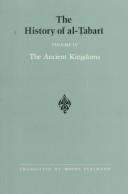
ISBN: 0585167869 9780585167862 1438415885 9781438415888 0887061818 9780887061813 0887061826 9780887061820 0877061818 Year: 1987 Publisher: Albany, N.Y. State University of New York Press
Abstract | Keywords | Export | Availability | Bookmark
 Loading...
Loading...Choose an application
- Reference Manager
- EndNote
- RefWorks (Direct export to RefWorks)
Jews --- Arabs --- Legends, Jewish. --- Christian legends. --- Legends, Christian --- Legends --- Legends, Jewish --- History. --- History --- Iran --- Jewish legends
Book
ISBN: 0827611641 0827611633 9781461956624 1461956625 9780827611641 9780827611634 9780827612099 0827612095 9780827611658 082761165X Year: 2014 Publisher: Lincoln Philadelphia
Abstract | Keywords | Export | Availability | Bookmark
 Loading...
Loading...Choose an application
- Reference Manager
- EndNote
- RefWorks (Direct export to RefWorks)
Ruth Calderon has recently electrified the Jewish world with her teachings of talmudic texts. In this volume, her first to appear in English, she offers a fascinating window into some of the liveliest and most colorful stories in the Talmud. Calderon rewrites talmudic tales as richly imagined fictions, drawing us into the lives of such characters as the woman who risks her life for a sister suspected of adultery; a humble schoolteacher who rescues his village from drought; and a wife who dresses as a prostitute to seduce her pious husband in their garden. Breathing new life into an ancient
Rabbinical literature --- Jewish legends. --- Jews --- Legends, Jewish --- Legends --- History and criticism.
Book
ISBN: 0814343929 0814343910 Year: 2018 Publisher: Wayne State University Press
Abstract | Keywords | Export | Availability | Bookmark
 Loading...
Loading...Choose an application
- Reference Manager
- EndNote
- RefWorks (Direct export to RefWorks)
The first appearance of Jews in Poland and their adventures during their early years of settlement in the country are concealed in undocumented shadows of history. What survived are legends of origin that early chroniclers, historians, writers, and folklore scholars transcribed, thus contributing to their preservation. According to the legendary chronicles Jews resided in Poland for a millennium and developed a vibrant community. Haya Bar-Itzhak examines the legends of origin of the Jews of Poland and discloses how the community creates its own chronicle, how it structures and consolidates its identity through stories about its founding, and how this identity varies from age to age. Bar-Itzhak also examines what happened to these legends after the extermination of Polish Jewry during the Holocaust, when the human space they describe no longer exists except in memory. For the Polish Jews after the Holocaust, the legends of origin undergo a fascinating transformation into legends of destruction.Jewish Poland-Legends of Origin brings to light the more obscure legends of origin as well as those already well known. This book will be of interest to scholars in folklore studies as well as to scholars of Judaic history and culture.
Jewish legends --- Jews --- History and criticism. --- Origin --- Legends, Jewish --- Legends --- Hebrews --- Israelites --- Jewish people --- Jewry --- Judaic people --- Judaists --- Ethnology --- Religious adherents --- Semites --- Judaism --- Social groups: religious groups & communities
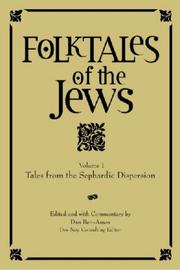
ISBN: 0827610459 9780827610453 0827608292 9780827608290 Year: 2006 Publisher: Philadelphia, Pa The Jewish Publication Society
Abstract | Keywords | Export | Availability | Bookmark
 Loading...
Loading...Choose an application
- Reference Manager
- EndNote
- RefWorks (Direct export to RefWorks)
Jews --- Jewish legends. --- Tales. --- Jewish legends --- Tales --- Sephardim --- Folk tales --- Folktales --- Folk literature --- Legends, Jewish --- Legends --- Folk-lore --- Jews in folk-lore --- History and criticism. --- Folklore
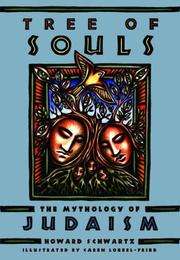
ISBN: 1280760443 0195358708 1429438681 9781429438681 9780195086799 0195086791 0195313496 9780195313499 9780195358704 0195086791 9780195327137 0195327136 9781280760440 0199879796 Year: 2004 Publisher: Oxford ; New York : Oxford University Press,
Abstract | Keywords | Export | Availability | Bookmark
 Loading...
Loading...Choose an application
- Reference Manager
- EndNote
- RefWorks (Direct export to RefWorks)
Demonstrates that there is a flourishing mythology in Judaism, which first emerges in the Bible and continues to evolve in all subsequent phases of Jewish literature and lore. This book identifies and collects nearly 700 of these primary Jewish myths. They are drawn from a range of sources including the Bible, and the Jewish apocryphal.
Jewish legends. --- Jewish mythology. --- Hebrew mythology --- Mythology, Hebrew --- Mythology, Jewish --- Mythology --- Jews --- Legends, Jewish --- Legends --- Jewish legends --- Jewish mythology --- 291.13 --- 296 --- 291.13 Mythe. Vergelijkende mythologie --- Mythe. Vergelijkende mythologie --- Judaïsme. Jodendom
Book
ISBN: 0814344534 0814344526 Year: 1993 Publisher: Detroit : Wayne State University Press,
Abstract | Keywords | Export | Availability | Bookmark
 Loading...
Loading...Choose an application
- Reference Manager
- EndNote
- RefWorks (Direct export to RefWorks)
Jewish Moroccan Folk Narratives focuses on two central elements: textual research to examine the aesthetic qualities of the narrative, their division into genres, the various versions and their parallels, and acculturation in Israel, as well as contextual research to examine the performance art of the narrator and the role of the narrative as a communicative process in the narrating society. The collection includes twenty-one narratives by twelve storytellers; an account of the narrators' lives and a commentary have been applied to each. In contrast to most anthologies of Jewish folktales, the texts in this book were recorded in the natural context of narration and in the language of origin (Judaeo-Arabic), meeting the most vigorous standards of current folklore scholarship.
Folk literature, Judeo-Arabic --- Jews, Moroccan --- Jewish legends. --- Tales --- Folklore. --- History and criticism. --- Translations into English. --- Shelomi (Israel) --- Social life and customs. --- Moroccan Jews --- Folk tales --- Folktales --- Folk literature --- Judeo-Arabic folk literature --- Judeo-Arabic literature --- Jews --- Legends, Jewish --- Legends --- Shlomi (Israel) --- Shlami (Israel) --- Chelomi (Israel) --- Social groups: religious groups & communities
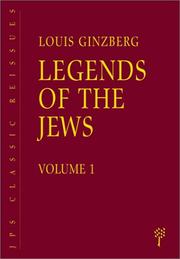
ISBN: 082761005X 9780827610057 0827607091 9780827607095 Year: 2003 Publisher: Philadelphia Jewish Publication Society
Abstract | Keywords | Export | Availability | Bookmark
 Loading...
Loading...Choose an application
- Reference Manager
- EndNote
- RefWorks (Direct export to RefWorks)
To this day Legends of the Jews remains a most remarkable and comprehensive compilation of stories connected to the Hebrew Bible. It is an indispensable reference on that body of literature known as Midrash, the imaginative retelling and elaboration on Bible stories in which mythological tales about demons and magic co-exist with moralistic stories about the piety of the patriarchs.
Aggada --- Midrash --- Jewish legends. --- Jews --- Legends, Jewish --- Legends --- Bible. --- Antico Testamento --- Hebrew Bible --- Hebrew Scriptures --- Kitve-ḳodesh --- Miḳra --- Old Testament --- Palaia Diathēkē --- Pentateuch, Prophets, and Hagiographa --- Sean-Tiomna --- Stary Testament --- Tanakh --- Tawrāt --- Torah, Neviʼim, Ketuvim --- Torah, Neviʼim u-Khetuvim --- Velho Testamento
Book
ISBN: 0814708110 0814723780 9780814723784 9780814708118 9780814740934 0814740936 Year: 2012 Publisher: New York, NY
Abstract | Keywords | Export | Availability | Bookmark
 Loading...
Loading...Choose an application
- Reference Manager
- EndNote
- RefWorks (Direct export to RefWorks)
For centuries, Jews have been known as the "people of the book." It is commonly thought that Judaism in the first several centuries CE found meaning exclusively in textual sources. But there is another approach to meaning to be found in ancient Judaism, one that sees it in the natural world and derives it from visual clues rather than textual ones. According to this conception, God embedded hidden signs in the world that could be read by human beings and interpreted according to complex systems.In exploring the diverse functions of signs outside of the realm of the written word, Swartz introduces unfamiliar sources and motifs from the formative age of Judaism, including magical and divination texts and new interpretations of legends and midrashim from classical rabbinic literature. He shows us how ancient Jews perceived these signs and read them, elaborating on their use of divination, symbolic interpretation of physical features and dress, and interpretations of historical events. As we learn how these ancient people read the world, we begin to see how ancient people found meaning in unexpected ways.
Judaism --- Semiotics --- Jewish art and symbolism. --- Symbolism in rabbinical literature. --- Jewish legends. --- Jewish mythology. --- Hellenistic Judaism --- Judaism, Hellenistic --- Jewish symbolism and art --- Jewish art --- Jewish arts --- Symbolism --- Symbolism in art --- Rabbinical literature --- Jews --- Legends, Jewish --- Legends --- Hebrew mythology --- Mythology, Hebrew --- Mythology, Jewish --- Mythology --- History --- Religious aspects --- Judaism. --- Jewish art and symbolism --- Jewish legends --- Jewish mythology --- Symbolism in rabbinical literature --- Semeiotics --- Semiology (Linguistics) --- Semantics --- Signs and symbols --- Structuralism (Literary analysis) --- Religious aspects&delete&
Book
ISBN: 0773411437 9780773411432 Year: 2011 Publisher: Lewiston, N.Y. Edwin Mellen Press
Abstract | Keywords | Export | Availability | Bookmark
 Loading...
Loading...Choose an application
- Reference Manager
- EndNote
- RefWorks (Direct export to RefWorks)
A book that concerns itself with the historical development of the fable or parable as a way of communicating knowledge and truth, in both Judaism and Christianity.
Bible -- Criticism, interpretation, etc. --- Bible -- Parables. --- Fables. --- God in literature. --- Jesus Christ -- Parables. --- Jewish legends. --- Jewish parables. --- Narration in the Bible. --- Parables in rabbinical literature. --- Rabbinical literature -- History and criticism. --- Narration in the Bible --- God in literature --- Parables in rabbinical literature --- Jewish parables --- Jewish legends --- Fables --- Rabbinical literature --- Religion --- Philosophy & Religion --- Christianity --- Hebrew literature --- Jewish literature --- Didactic literature --- Exempla --- Fiction --- Homiletical illustrations --- Legends --- Literature --- Tales --- Allegories --- Parables --- Jews --- Legends, Jewish --- Parables, Jewish --- History and criticism --- Jesus Christ --- Parables. --- Bible --- Criticism, interpretation, etc. --- Christ --- Cristo --- Jezus Chrystus --- Jesus Cristo --- Jesus, --- Christ, Jesus --- Yeh-su --- Masīḥ --- Khristos --- Gesù --- Christo --- Yeshua --- Chrystus --- Gesú Cristo --- Ježíš --- Isa, --- Nabi Isa --- Isa Al-Masih --- Al-Masih, Isa --- Masih, Isa Al --- -Jesus, --- Jesucristo --- Yesu --- Yeh-su Chi-tu --- Iēsous --- Iēsous Christos --- Iēsous, --- Kʻristos --- Hisus Kʻristos --- Christos --- Jesuo --- Yeshuʻa ben Yosef --- Yeshua ben Yoseph --- Iisus --- Iisus Khristos --- Jeschua ben Joseph --- Ieso Kriʻste --- Yesus --- Kristus --- ישו --- ישו הנוצרי --- ישו הנצרי --- ישוע --- ישוע בן יוסף --- المسيح --- مسيح --- يسوع المسيح --- 耶稣 --- 耶稣基督 --- 예수그리스도 --- Jíizis --- Yéshoua --- Iėsu̇s --- Khrist Iėsu̇s --- عيسىٰ
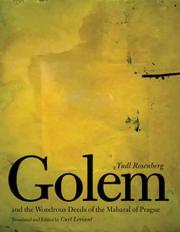
ISBN: 1281734837 9786611734831 030013472X 9780300134728 9780300122046 0300122047 9781281734839 9780300143201 0300143206 661173483X Year: 2007 Publisher: New Haven Yale University Press
Abstract | Keywords | Export | Availability | Bookmark
 Loading...
Loading...Choose an application
- Reference Manager
- EndNote
- RefWorks (Direct export to RefWorks)
This collection of interrelated stories about a sixteenth-century Prague rabbi and the golem he created became an immediate bestseller upon its publication in 1909. So widely popular and influential was Yudl Rosenberg's book, it is no exaggeration to claim that the author transformed the centuries-old understanding of the creature of clay and single-handedly created the myth of the golem as protector of the Jewish people during times of persecution.In addition to translating Rosenberg's classic golem story into English for the first time, Curt Leviant also offers an introduction in which he sets Rosenberg's writing in historical context and discusses the golem legend before and after Rosenberg's contributions. Generous annotations are provided for the curious reader.The book is full of adventures, surprises, romance, suspense, mysticism, Jewish pride, and storytelling at its best. The Chief Rabbi of Prague, known as the Maharal, brings the golem Yossele to life to help the Jews fight false accusations of ritual murder-the infamous blood libel. More human, more capable, and more reliable as a protector than any golem imagined before, Rosenberg's Golem irrevocably changed one of the most widely influential icons of Jewish folklore.
Golem. --- Blood accusation --- Jewish legends. --- Jews --- Legends, Jewish --- Legends --- Blood libel --- Murder, Ritual --- Ritual murder --- Blood --- Human sacrifice --- Jewish legends --- Mysticism --- Religious aspects --- Persecutions --- Judaism --- Judah Loew ben Bezalel, --- Besalʹel, Yehûdah Liwa ben, --- Betsalel, Juda Loeb ben, --- Betsalʼel, Yehudah Liṿa ben, --- Bezaleel, Judah Löw ben, --- Bezaleel, Liwa ben, --- Bezaleel, Löw ben, --- Bezalel, Judah Loew ben, --- Beẓalel, Yehuda Leove ben, --- Jehuda Löw ben Becalel, --- Juda Loeb ben Betsalel, --- Judah Liwa ben Bezalel, --- Judah Loeb ben Bezalel, --- Judah Löw ben Bezaleel, --- Leyb, --- Liṿa, Yehudah ben Betsalʼel, --- Liwa ben Bezaleel, --- Löw ben Bezaleel, --- Löw, Jehuda, --- Maharal, --- Prag, Maharal mi-, --- Yehuda Leove ben Beẓalel, --- Yehuda Liṿai ben Betsalʼel, --- Yehudah Liṿa ben Betsalʼel, --- Yehûdah Liwa ben Besalʹel, --- לוואי, יהודא --- ליוא בר בצלאל --- ליוואי, יהודא --- מהר״ל, --- מהר״ל מפראג --- מהר״ל מפראג, --- מהר״ל מפרג --- מהרל --- בצלאל, יהודה ליואי --- הרטמן, יהושע דוד, --- המהר״ל, --- יהודא לװאי ב״ר בצלאל, --- יהודא ליווא בר בצלאל --- יהודא ליווא בן בצלאל --- יהודא ליווא בן בצלאל, --- יהודא ליוואי בר בצלאל --- יהודא ליוואי בר בצלאל, --- יהודא ליוואי ברבי בצלאל, --- יהודא ליוואי ב״ר בצלאל, --- יהודא ליוואי בן בצלאל --- יהודא ליוואי בן בצלאל, --- יהודה לײב בן בצלאל, --- יהודה לב בן בצלאל --- יהודה ליאוואי בן בצלאל, --- יהודה ליאוואי בן יהודה, --- יהודה ליב בן בצלאל --- יהודה ליב בן בצלאל, --- יהודה ליוא בן בצלאל, --- יהודה ליווא --- יהודה ליווא בר בצלאל --- יהודה ליווא בר׳ בצלאל, --- יהודה ליווא ב״ר בצלאל, --- יהודה ליווא בן בצלאל --- יהודה ליווא בן בצלאל, --- יהודה ליוואי בצלאל, --- יהודה ליוואי בר׳ בצלאל --- יהודה ליוואי ברבי בצלאל --- יהודה ליוואי ברבי בצלאל, --- יהודה ליוואי ב״ר בצלא.ל --- יהודה ליוואי בן בצלאל, --- יהודה ליוואי בן בצליאל, --- יהודה ליוואיבר בצלאל --- יהודה לייב בן בצלאל, --- יהודה בצלאל ליווא --- יהודה ברבי בצלאל (המהר״ל מפראג) --- יהודה בן בצלאל --- יהודה בן בצלאל, --- יודא ליווא בן בצלאל, --- יודה ליב בן בצלאל --- יודה ליווא בן בצלאל
| Listing 1 - 10 of 10 |
Sort by
|

 Search
Search Feedback
Feedback About UniCat
About UniCat  Help
Help News
News